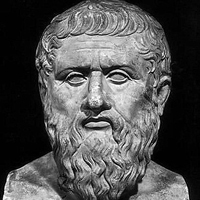Critical Note on The Allegory of the Cave
The Allegory of the Cave is the seventh chapter of Plato’s most celebrated book The Republic in which he seeks for justice, which only an ideal form of government can offer. He has imagined a state, which he calls the Ideal State, in which people should be politically free.

Plato (427-347 BC)
They should have a clear vision of life, which they can do only by coming out of the sensory illusion. He takes this world, the world of perception, as the shadow or imitation or reflection of the Real World, the world of being. Therefore, this world of Plato is just an illusion.
By this point, he opens The Allegory of the Cave, which is in a dialogue form, a dialogue between his teacher Socrates and Gloucan, one of the listeners of Socrates’ speech. Here we find Plato’s two powerful techniques – dialogue and allegory – which he used in almost all of his works. Allegory itself means a story that implies its meaning in another situation. At the beginning of the present essay, we are taken into a dark cave in which the prisoners (the people in the cave) could see shadows of the real objects that are reflected by the fire behind them on the opposite wall. The prisoners take the shadows as real because of their ignorance of the reality outside the cave. In this sense, the cave has been used as an allegory for the world and the prisoners for the people in it. This world is inferior to the upper world, the world of light.
If one of the prisoners is taken out of the cave and led into the world of light, he will be perplexed; he will surely feel a sharp pain in his eyes as he is not accustomed to see things in the light. However, once he sees the light, he will feel it futile to compete in observing the passing shadows in the cave and to have honor for measuring them the most quickly. He denounces the earthly life and glories. But if he is again taken back into the cave, he will again be perplexed, his eyesight will fail to see things in the darkness, and he will be called blind. And if he tries to rescue his fellow prisoners from the den of darkness, he will be condemned as an offender and put to death. Here Plato is probably referring to the death of Socrates, who was poisoned to death by the tyrants, who then were ruling over Athens. He was given a death punishment in charge of corrupting the Athenian youths.
Plato then moves forward with the idea of redeeming (rescuing) the prisoners from darkness (to light), for which he proposes to use art, that is literature, which turns their sight towards the direction of truth. But the art should not provide them the sensual pleasures which, like a heavy load, drag them down into the world of darkness. They should cultivate (foster) the virtue of wisdom, which is their innate quality, as opposed to the virtues of the soul which are related to bodily qualities and which can be achieved through habit and exercise.
Regarding the redemption of the prisoners, Plato proposes to send the philosophers, who have seen the light and known truth, back to the den and teach them (the prisoners) the path of truth and light which will liberate them from the illusion and darkness. Since God intended equal happiness to everyone when He created this world, it will be unfair if the prisoners are left in the den of darkness whereas the philosophers are granted happiness in the upper world. Therefore, in order to bring about equality, Plato thinks that the prisoner too should be shown the light and liberated.
While talking about people’s equality, which is their natural right, he finally comes to politics; which is the main concern of this essay. He says that those who are uneducated, ignorant of truth and idle cannot be the rulers of the Ideal State he had imagined. He outlines a true form of government and good rulers of his State. If the best and the most intelligent young men are made, rules of the state, they can rule truly and provide happiness and freedom to the people, thus the state will flourish. But if the rulers are eager to rule or have greed and personal ambition, they will not only destroy the state but also bring about their own ruin. Therefore, they should rule disinterestedly (without selfishness); they should have virtue and wisdom, which are the true blessings of life and finally they should be able to seek a better life.
Plato ends the essay saying through Socrates, that the life of true philosophy is that which denounces or hates the political ambition. In other words, one can achieve a life of true philosophy only if one serves disinterestedly in this world and looks forward to living a happy life in the spiritual realm.
Browse by Question
The Allegory of the Cave
Brief Summary on The Allegory of the Cave
The Allegory of the Cave: Meaning and Inerpretaton
 |
bachelorandmaster.com |